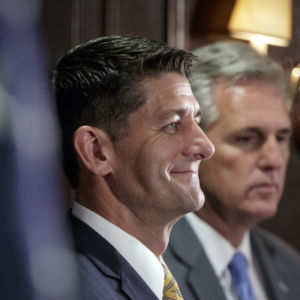Republican leadership took a major step in its goal to reform the tax code Wednesday by releasing a framework which details what the final bill may look like.
Republicans have worked for nearly two years in their most recent push to fundamentally reform the tax code. Their focus on rate reductions and simplification have remained a pivotal part of their plan throughout the process. President Donald Trump is scheduled to discuss the new framework later in Indianapolis, Indiana.
“Today, we move one step closer to fixing our broken tax code so that it puts Americans first,” House Speaker Paul Ryan said in a statement. “This is our best opportunity in a generation to deliver real middle-class tax relief, create jobs here at home, and fuel unprecedented economic growth.”
The tax reform framework reduces the seven current income brackets down to three. The top individual tax rate at 39.6 percent will be reduced to 35 percent. The framework also taxes middle-income earners at 25 percent, and lower-income earners at a slightly higher rate of 12 percent. It does leave room for lawmakers to add an additional top rate for high earners.
Republicans hope to boost economic growth through tax reform. The framework reduces rates for corporations down to 20 percent. The top rate for corporations is currently at 35 percent, which is one of the highest rates in the world. This high rate has led companies to keep more of their profits overseas or move their corporate headquarters abroad.
The GOP tax plan also limits the rate paid by small and family-owned businesses to 25 percent. The new rate limit is lower than the top rate that these businesses currently pay. These earnings are typically taxed as pass-through income to the owners.
Republicans hope to simplify the tax code by eliminating tax breaks that primarily benefit the wealthy. The framework also repeals the alternative minimum tax and the death tax. Homeownership and charitable gift tax deductions will be protected under the plan.
Trump has focused much of his agenda of keeping jobs from going overseas. The tax framework reflects that push by including a one-time tax on businesses keeping offshore profits. It also switches to a territorial tax system which is designed to benefit companies that keep operations within the country.
The tax system hasn’t been reformed in a comprehensive way since 1986. The Congressional Budget Office (CBO) found in an analysis that many other developed countries have been moving towards a more competitive tax system in the decades since.
“It has been 31 years since we last got this done, and hardworking families and small businesses cannot afford to wait any longer,” Ryan said. “Under President Trump’s leadership, we are determined to finally give the American people the simpler, fairer, and more competitive tax system they deserve.”
The tax reform framework comes after nearly a year of hearings and internal discussions that built upon previous policy drafts. House Speaker Paul Ryan and Rep. Kevin Brady introduced a blueprint last year which outlined their earlier policy goals. Trump later released a summary plan which included many of the same provisions April 26.
Republican leadership spent the last week ensuring party members had the chance to hammer out any last minute details. Republicans held a two-day private retreat so that they could hash out the details openly. The approach may help them avoid problems that caused their healthcare reform efforts to falter.
The National Taxpayers Union Foundation found in a 2015 study that the economy loses $233.8 billion and 6.1 billion hours of lost productivity annually because of the complex tax code. The Government Accountability Office found in a 2014 study that the tax code is so complex that very few professional tax preparers are able to calculate the correct tax refund.
The budget is also likely to play a pivotal role in getting tax reform passed. Republicans will only need a simple majority if they include tax reform as part of the reconciliation process. Republicans have to first pass a budget that includes provisions for tax reform for it to be included in that process. Democrats as a whole aren’t likely to support the eventual tax reform bill making party unity and a simple majority vote a necessity.

